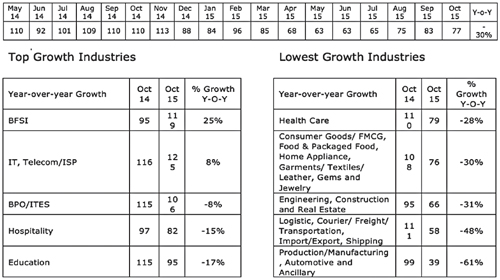IF the trend in online hiring is to be used as basis, the country is still far from solving its problem on job-skill mismatch, a phenomenon that the government and private sector already noticed and sought to address since the early 2000s.
According to the latest Monster Employment Index (MEI), online-hiring activity nationwide contracted 30 percent in October 2015, almost double the 16-percent drop in September 2015.
The main reason cited in the MEI survey was the lack of right skill sets for the jobs available.
“Despite the strong growth in the Philippines’s economy, the country struggles to keep up with its growing population, leading to underemployment among the working population. There may have been a surge in the number of job roles created, including government job roles, but candidates may not necessarily be equipped with the right skill sets for the jobs,” said Sanjay Modi, managing director at Monster.com
Even in the services sector—the main driver of Philippine growth—online hiring was considerably low.
None of the 10 occupational groups saw positive increase in October.

Customer service jobs experienced a decline of -2 percent year-on-year—the first time for this category to register a negative rate in the last four months.
Also registering drops were finance and accounts at -3 percent; sales and business development, -14 percent; human resource and admin, -18 percent; purchase, logistics and supply chain, -20 percent; marketing and communications, -25 percent; health care, -26 percent; software, hardware and telecom, -27 percent; and engineering/production and real estate, -39 percent.
While tourism industry is booming at present, hospitality and travel jobs reported a huge decline in online recruitment at -45 percent.
Industry-wise, the banking, financial services and insurance industry witnessed the steepest hike at 25 percent in the two comparable periods.
It surpassed the information technology, telecom/Internet service provider at 8 percent.
Meanwhile, the production/manufacturing, automotive and ancillary again performed the worst at -61 percent.
Other laggards were the business-process outsourcing and information technology enabled services at -8 percent; hospitality, -15 percent; education, -17 percent; health care, -28 percent; consumer goods/fast-moving consumer goods, food and packaged food, home appliance, garments/textiles/leather, gems and jewellery, -30 percent; engineering, construction and real estate, -31 percent; and logistic, courier/freight/transportation, import/export and shipping, -48 percent.
“At this point, the government may have to focus on boosting job opportunities in the agriculture and education sectors, on top of implementing more policies to manage the population and enhance employment in the country,” Modi stressed.
The MEI records the industries and occupations that show the highest and lowest growth in recruitment activity locally.
The index is based on a real-time review of millions of job opportunities culled from a large representative selection of career web sites and online job listings across the Philippines.
Launched in May 2015, with data collected since February 2014, the MEI is a broad and comprehensive monthly analysis of online job posting activity in the Philippines conducted by Monster India. –Cai Ordinario, Roderick Abad, BusinessMirror
#WearMask #WashHands
#Distancing
#TakePicturesVideos

